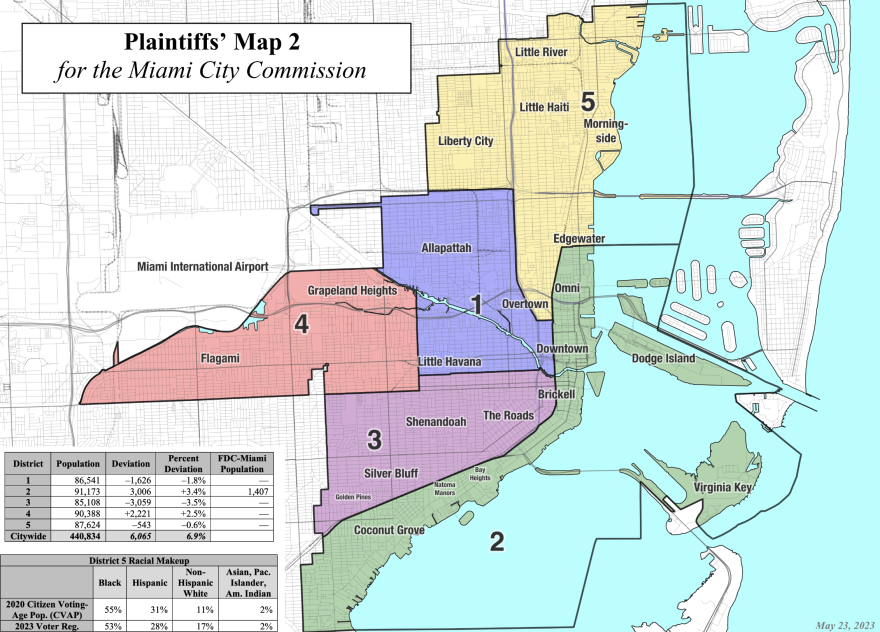Following a federal judge's ruling that Miami must throw out its new district map, plaintiffs who accused the city of racial gerrymandering have already put forth some new ideas for the future of Miami's five districts.
The ACLU of Florida, which represents a number of local advocacy groups that sued the City of Miami over its 2022 redistricting, published two potential remedial maps they'd like the city to consider as it goes back to the drawing board.
Earlier this week, a federal judge ordered the city to throw out its existing map and attend mediation with the plaintiffs before drawing up a new, legally compliant map before the Nov. 7 local elections. He sided with the plaintiffs — a group including two local branches of the NAACP, Engage Miami and Grove Rights and Community Equity, Inc (GRACE) — because commissioners discussed the racial make-up of the districts at length in their talks with a mapmaker during redistricting.
The proposed maps, available on the ACLU Florida's website, separate the city's population of approximately 441,000 people roughly equally into five districts. In their filings, the plaintiffs also say the new maps chart the districts along natural boundaries like the Miami River, highways and neighborhood borders, something critics of the city's redistricting process called for last year.
READ MORE: Federal judge throws out Miami district map over allegations of racial gerrymandering
"Both maps feature compact and logical districts that respect neighborhoods, follow major geographic boundaries, and preserve genuine communities of interest. They undo the racial gerrymandering that has violated Miamians’ rights to equal protection of the laws, while also complying with the crucial mandates of the Voting Rights Act," the plaintiffs wrote in a public letter to the city commission on Tuesday.

Neighborhood divided across districts
Detractors of the original redistricting process lamented that the city's map split existing neighborhoods between districts, making it so neighbors in one community would have to go to different elected officials for the same issues.
The Coconut Grove neighborhood, a community known for its political involvement and activism, was fragmented into three separate districts, after spending the past few decades solely in District 2.
Both of the plaintiffs' proposed maps restore Coconut Grove entirely to District 2. They also seriously reduce the size of the districts to make them more compact and with fewer jagged protrusions than in their current state.
District 2 — which currently goes up the coast all the way north to the Morningside neighborhood — would stop at the northern edge of downtown on the Miami River in one of the plaintiffs' optional maps, or only go so far as Edgewater in the second option. In their letter, the plaintiffs said their first option is their preferred choice for the city map.
"Our maps propose a new way forward, advancing representation and putting racial gerrymandering behind us. It’s time for the City Commission to follow the law, listen to the community, and fulfill its obligation to afford all Miami residents with fair representation," said Harold Ford, President of the South Dade Branch of the NAACP, in an emailed statement.
The Miami City Attorney's office did not immediately respond to a request for comment from WLRN via email about the plaintiffs' proposed maps.
Victoria Mendez, Miami city attorney, said: "The City of Miami is disappointed with the Court's decision as it is still our position that we complied with the Voting Rights Act. We are reviewing options on how to best proceed. We have been ordered to mediation as well."






